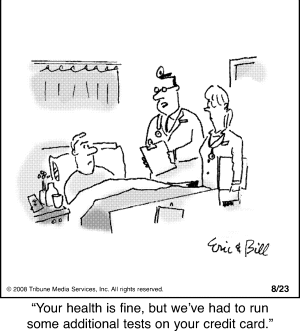Health Care in 2009. Vocabulary you need to know.
 The health care discussion in 2009 will focus around three primary terms which are easily confused and often interchanged, even though they have very different meanings. With health care on the top of Obama’s agenda understanding of this critical issue has never been more important. Universal health care is health care coverage that is extended to all eligible residents of a governmental region. This system often covers medical, dental, and mental health care. For Americans this would amount to a set of regulations requiring insurance companies to offer coverage to all Americans regardless of pre-existing conditions. The system is otherwise unchanged. Socialized medicine is a term invented by the American political system that is most often used to describe any government involvement in healthcare, and it should be noted that this is an incorrect use of the phrase “socialized medicine”. The literal meaning is describes systems in which the government operates health care facilities and also employs health care professionals. The United States’ Veterans Health Administration, and the medical departments of the U.S. Army, Navy, and Air Force would also fall under this narrow definition. Outside of health care America also has socialized primary and secondary education, law enforcement, and fire protection. Single-payer health care is the payment of doctors, hospitals, and other health care providers from a single source, usually the government. Unlike socialized health care the government only finances the system and is not involved with the health care delivery. Currently the United States’ Medicare, Medicaid, and TRICARE are examples of single-payer health care. In the United States a national singe-payer system would be analogous to Medicare for all. Under a single-payer system patients would still enjoy the freedom of going to doctors of their choice and expedient emergency service. Single-payer systems often cover medical, dental, and mental heath care with a very strong emphasis on preventative care. Supporters argue that it would provide universal coverage with at least the same quality and greatly lower costs. Opponents instead advocate tax incentives and for-profit, free market approaches. For more information I give you the obligatory wikipedia links:
The health care discussion in 2009 will focus around three primary terms which are easily confused and often interchanged, even though they have very different meanings. With health care on the top of Obama’s agenda understanding of this critical issue has never been more important. Universal health care is health care coverage that is extended to all eligible residents of a governmental region. This system often covers medical, dental, and mental health care. For Americans this would amount to a set of regulations requiring insurance companies to offer coverage to all Americans regardless of pre-existing conditions. The system is otherwise unchanged. Socialized medicine is a term invented by the American political system that is most often used to describe any government involvement in healthcare, and it should be noted that this is an incorrect use of the phrase “socialized medicine”. The literal meaning is describes systems in which the government operates health care facilities and also employs health care professionals. The United States’ Veterans Health Administration, and the medical departments of the U.S. Army, Navy, and Air Force would also fall under this narrow definition. Outside of health care America also has socialized primary and secondary education, law enforcement, and fire protection. Single-payer health care is the payment of doctors, hospitals, and other health care providers from a single source, usually the government. Unlike socialized health care the government only finances the system and is not involved with the health care delivery. Currently the United States’ Medicare, Medicaid, and TRICARE are examples of single-payer health care. In the United States a national singe-payer system would be analogous to Medicare for all. Under a single-payer system patients would still enjoy the freedom of going to doctors of their choice and expedient emergency service. Single-payer systems often cover medical, dental, and mental heath care with a very strong emphasis on preventative care. Supporters argue that it would provide universal coverage with at least the same quality and greatly lower costs. Opponents instead advocate tax incentives and for-profit, free market approaches. For more information I give you the obligatory wikipedia links:
Comments